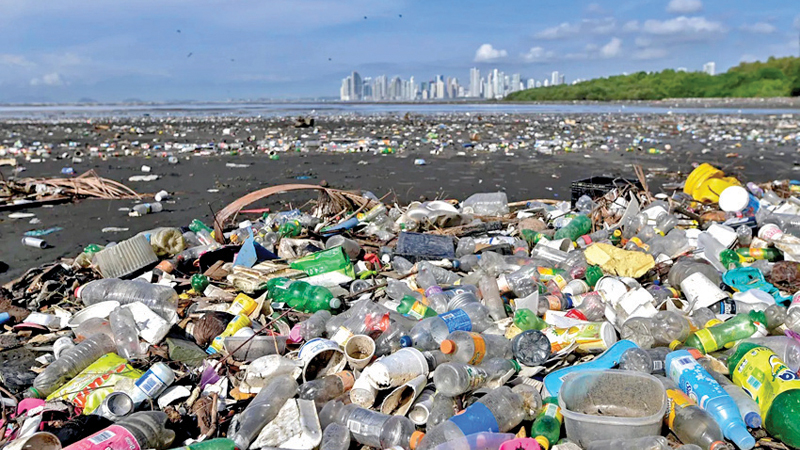 With over 430 million tons of plastic produced each year, two-thirds of which are cast aside as waste after just one use, plastic material-related pollution damages the planet Earth beyond imagination. Pollution harms the environment, oceans and the entire eco-system essential to human existence. Organisations around the world, including the United Nations Environment Programme, are constantly and continuously raising the alarm about the severity of the plastic pollution crisis.
With over 430 million tons of plastic produced each year, two-thirds of which are cast aside as waste after just one use, plastic material-related pollution damages the planet Earth beyond imagination. Pollution harms the environment, oceans and the entire eco-system essential to human existence. Organisations around the world, including the United Nations Environment Programme, are constantly and continuously raising the alarm about the severity of the plastic pollution crisis.
In Sri Lanka, the issue has emerged as one of the most persistent concerns that adversely affect the diverse ecosystems, human health, economy and cultural heritage of the country. Despite its natural beauty and rich biodiversity, the country confronts a growing crisis due to the improper disposal and mismanagement of plastic waste.
The scenic landscapes, coastal regions, and ecosystem suffer from the detrimental effects of improper and inconsiderate plastic use. The inadequate waste management infrastructure and the prevalence of single-use plastics have resulted in the contamination of urban and rural environments, particularly the coastal areas and other recreational and religious hotspots in the country.
As per government statistics, about 500,000 metric tons of plastic-related material are imported to Sri Lanka annually as raw materials and saleable products. Studies conducted by various environmental institutions have revealed that only 10 percent of the total produced is being recycled in Sri Lanka. This means that a staggering quantity is constantly adding waste to the environment. Improper disposal of plastics tremendously harms the environment countrywide, which is directly and indirectly damaging to human life.
Alternatives to lunch sheets
Recently, the media reported that the government is allocating six months to find alternatives to curbing heavily used lunch sheets in the country. However, at least four different times during the past few years, the government has banned the substance used for making lunch sheets.
Yet, the result as of now is negligible, and the lunch sheets and other polythene products are still being used by unconcerned people, disregarding all warnings about pollution. This means that importers and manufacturers grossly disregard government regulations, and the public knowingly ignores the negative impacts of plastic use.
For example, according to the Maskeliya Pradeshiya Sabha, about a metric ton of plastic polyethylene terephthalate (PET) bottles and other non-degradable waste is collected from around Sri Pada, one of the most sacred pilgrim destinations in Sri Lanka, every day during the pilgrimage season. This is an ongoing phenomenon, year after year, despite constant campaigns by authorities in the area and the media. This paints an extremely dark picture of the uncaring public reaction to pollution.
For example, according to the information from the Central Environmental Authority (CEA), the principal government agency with wide regulatory power in environmental considerations, the monthly consumption of lunch sheets alone is staggering at 15 to 20 million. Also, the monthly consumption of yoghurt cups is said to be around two million. Meanwhile, the information reveals that around 22 million polyethene bags are being discarded daily and added to the environment as polythene waste.
Pollution challenges
Coastal areas, vital for tourism and fisheries, face immense plastic pollution challenges. Plastic debris not only harms marine life but also affects coral reefs, impacting the country’s vibrant marine ecosystem. Seabirds, turtles and marine mammals often fall victim to ingestion or entanglement in plastic waste, leading to injury and mortality.
It has been estimated that the country’s polythene demand has increased considerably during the past three decades, and the rate is expected to rise further. Therefore, pollution levels will also increase, affecting human lives. The environmentalists reveal that Sri Lanka is among the first 10 countries to release plastic waste into the ocean.
Environmentalists and conservationists said that the government’s direct involvement is inadequate to control the import of plastic and polythene-related material to Sri Lanka. According to these specialists, the issuance of licences arbitrarily to importers without a proper understanding of the negative environmental impact causes a considerable escalation of pollution. They suggest that Sri Lanka Customs does not possess sufficient facilities to carry out proper tests and is compelled to accept the importer’s information.
The impact of plastic pollution extends to human health in Sri Lanka. Contaminated water sources due to plastic waste contribute to waterborne diseases, posing health risks to communities around the country, especially those with limited access to clean water. Moreover, the burning of plastic waste in open spaces releases harmful toxins into the air, affecting the respiratory health of nearby residents.
Studies have revealed that the potential links between harmful chemicals, toxins and other substances in plastics cause many health issues, including hormonal disruptions, reproductive problems and oncogenic effects. The improper discarding and burning of plastic waste release lethal pollutants into the air, worsening respiratory issues and contributing to air pollution, which affects communities, particularly those living near waste disposal sites or incinerators.
Economic consequences
The negative economic consequences of plastic pollution cannot be treated as elementary. It takes a toll on Sri Lanka’s economy, affecting industries vital to the nation’s livelihoods. For example, the tourism industry, a key contributor to the country’s economy as the third-highest forex earner, suffers from the degradation primarily of unspoiled beaches and coastal areas. Fisheries, another crucial sector, faces challenges due to plastic waste damaging marine ecosystems and impacting fish populations.
The costs associated with cleaning plastic waste, managing landfills and addressing environmental damage impose heavy financial burdens on the government and local authorities. Diverting resources from other essential development projects takes a toll due to the expenditure incurred on disposing of and cleaning plastic waste.
Sri Lanka grapples with several challenges in tackling plastic pollution, including inadequate waste management infrastructure, a lack of awareness among the population and limited resources for comprehensive waste disposal and recycling facilities. The absence of effective policies and regulations to control the production and use of plastic exacerbates the problem.
However, efforts to combat plastic pollution in Sri Lanka are under way. Various Non-Governmental Organisations (NGOs) and community initiatives, with the help of traditional and social media, focus on beach clean-ups, waste management education and promoting eco-friendly alternatives to single-use plastics.
The Government has also taken steps to ban certain plastic products and promote recycling practices, although more comprehensive measures and more concerted efforts are needed.
Multifaceted approach
Addressing plastic pollution in Sri Lanka requires a multifaceted approach. Strengthening waste management systems, investing in recycling infrastructure and promoting the use of biodegradable alternatives are essential steps in this regard. Mass media can play a more decisive role in educating the public on the hazardous effects of pollution and the use of recyclable alternatives.
Enforcing stricter regulations on plastic production and use and incentivising sustainable practices can significantly reduce plastic pollution.
Education and awareness campaigns targeting schools, communities and industries can foster behavioural changes and promote responsible waste disposal practices.
Introducing environmental protection early in the school curriculum can be immensely beneficial. Collaborative efforts involving government bodies, the private sector, civil society and international partnerships are crucial for effective policy implementation and resource mobilisation.
Despite continuous attempts by the authorities, plastic pollution poses a grave threat to Sri Lanka’s environment, economy and public health. The action taken thus far has not indicated any decline in plastic pollution. Hence, urgent action is necessary to mitigate its impact and safeguard the country’s natural environment.









